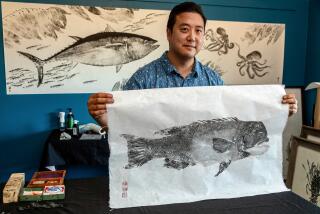Dry-Cleaner Says Old Way Is All Wet
- Share via
Customers still come in with a sack of dry-cleaning in one arm and a sack of plain laundry in the other, asking Joe Whang to be extra-careful with that cashmere coat, to handle the down comforter with care, to watch those sequins.
But it doesn’t much matter. And Whang, 63, gets a chuckle out of it all. At his storefront--Cypress Plaza Cleaners--at Ball Road and Walker Street in Cypress, clothing labels are meaningless: Here, everything is “wet-clean only.”
Whang is the only garment cleaner in Orange County and, experts said, one of only a handful in California to use a special process that cleans clothes without sometimes toxic dry-cleaning chemicals. “It is simple. We use a fancy . . . and very special washing machine,” Whang said.
It cost him about $50,000 to switch to a wet-cleaning system--first used in Europe about a dozen years ago--but he did it, he said, because he believed dry-cleaning chemicals might be contributing to problems with his thyroid gland, problems that have vanished since the conversion.
Today, the South Coast Air Quality Management District is giving Whang a Clean Air Award because, officials said, he took the time and spent the money to run a cleaner business. Whang will receive the award at a luncheon for environmentally conscious companies and individuals at the Biltmore Hotel in Los Angeles. “I consider him on the arrow-tip of where we should be going [environmentally],” said William Burke, chairman of the AQMD. “Dry-cleaning chemicals can be extremely toxic, and wet-cleaning is just as good.”
Typically, dry-cleaners use a chemical called perchloroethylene to clean clothes. Experts consider the chemical toxic, and dry-cleaners are supposed to post a sign telling customers it could cause cancer. The chemical, experts said, evaporates quickly, so the threat is to those who work with it over a long period.
For Whang, it all started in 1995, when he began losing weight and his eyes began to bulge. He lost 30 pounds, all told. Whang’s doctors were stumped as to a diagnosis and wondered if dry-cleaning chemicals might be responsible. Whang said he was sure the chemicals had something to do with it but couldn’t pinpoint their role. Many cleaners send clothes out to a dry-cleaning plant, but Whang was doing his own dry-cleaning at his store and had always wondered about the fumes.
It took a few years of research, but by 1998 Whang had a wet-cleaning system installed at his store. It consists of two hulking stainless-steel units--in essence, an immense washing machine and dryer akin to those most people have in their homes--controlled by a computer that wash and dry any fabric with special, extra-gentle detergents.
These days, Whang examines clothes and inputs a special code--for delicate wools, or silks, or acrylics, or wedding dresses--into the system’s computer, and the machine washes the clothes accordingly. It is more work, Whang said. Clothes must be removed from the dryer before they are completely dry--to prevent shrinkage--and come out extremely wrinkled.
But the end results, he said, are the same--and are worth it. Whang said few customers even notice. And often those who do have made a special effort anyway: “It’s very funny. I have customers come from Irvine, from Costa Mesa, from all over. I guess they want to have their clothes cleaned naturally.”
Whang said items such as shirts cost about 20 cents more because of the extra work involved. But, he said, he thinks he’s done 10% more business--with environmentally conscious consumers--since he bought the system.
It still is unclear whether dry-cleaning chemicals caused Whang’s medical problems, but, in his gut, Whang feels like he knows. “I stopped taking my medication for one year--when we got the new [machines]. I don’t take it anymore. My doctor says I am healthy and don’t have a problem anymore. They think the [medicine] worked. I think I know it was more than the treatment.”
But, he said, even if the chemicals weren’t what made him sick, it still was worthwhile to make the switch. “Clean clothes,” Whang said, “clean air for everybody.”
More to Read
Sign up for Essential California
The most important California stories and recommendations in your inbox every morning.
You may occasionally receive promotional content from the Los Angeles Times.













